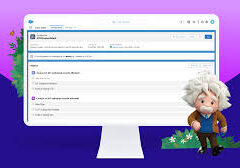What Marketers Need to Know About AI Agents, Tech’s Next Big Bet
Companies like Salesforce and OpenAI are making significant investments in AI agents, which are digital assistants poised to represent the next evolution of artificial intelligence. These agents promise to autonomously handle a variety of tasks, from making reservations to negotiating business deals.
During OpenAI’s DevDay event in San Francisco last week, the company showcased a voice bot that successfully ordered 400 chocolate-covered strawberries from a local delivery service, specifying delivery and payment terms with minimal issues. OpenAI CEO Sam Altman stated, “2025 is when agents will work,” highlighting the potential for these technologies to revolutionize workflows.
While this may seem futuristic, companies like Salesforce, HubSpot, and Pactum AI are already implementing their own AI agents, though examples from brands like Qantas Airways remain relatively scarce—a point of discussion at Advertising Week New York.
What Are AI Agents?
AI agents extend beyond mere chatbots. According to Parasvil Patel, a partner at Radical Ventures, they lack a single unifying definition and encompass a wide range of functionalities, from automating workflows to scheduling meetings. The overarching goal, however, is clear: “The ultimate aim is to execute work autonomously,” Patel explained.
Currently, AI agents are in the “co-pilot” phase, handling specific tasks such as summarizing meetings. The true breakthrough will occur when they transition to “autopilot,” managing more complex tasks without human intervention. According to Patel, this shift could take up to 24 months.
When Did They Emerge?
AI agents first gained attention on social media in early 2023, with various startups, including AutoGPT—an open-source application built on OpenAI’s models—promising autonomous capabilities. However, Patel notes that many of these early experiments were not robust enough to be deployed effectively in production environments.
How Are Companies Using AI Agents?
The appeal of AI agents lies in their ability to save time, enhance efficiency, and free employees from repetitive tasks. For instance, a large distribution company struggling to manage 100,000 suppliers utilized Pactum’s AI, which deploys autonomous agents for negotiations. Instead of seeing negotiations as a dead end, these AI agents continuously customized payment deals based on the speed of suppliers’ goods. This approach led to price discounts, rebates, and allowances.
Salesforce has also seen positive results with its AI agents. Its pilot program, AgentForce, launched with five clients—including OpenTable and global publisher Wiley—and achieved a 40% increase in case resolution compared to its previous chatbot for Wiley. At the firm’s Dreamforce event, Salesforce demonstrated AgentForce with Ask Astro, assisting attendees in planning their schedules by suggesting sessions and making reservations.
Salesforce’s chief marketing officer, Ariel Kelman, stated that the company has heavily invested in developing its AI agent platform in response to client demand. “What companies are figuring out with generative AI is how to deliver productivity improvements for employees and provide meaningful interactions with customers,” he noted.
What About Roadblocks?
The journey to fully functional AI agents is not without challenges. Managing different data formats—text, images, and videos—can be complex, as highlighted by William Chen, director of product management for AI & emerging tech at Agora. “Your system is only as good as your data source,” he said.
For Salesforce, the challenge lies in the nascent customer adoption of AI agents, with companies just beginning to explore how to leverage them for productivity, according to Kelman. The key challenge is determining what solutions work best for employees and customers across various use cases.
Are Jobs at Risk?
Not necessarily. AI agents are unlikely to replace jobs in the immediate future. Instead, they allow employees to focus on more strategic and meaningful tasks. Rand explained, “The role of people will shift to configuring the autopilot, rather than flying the plane, which is a positive change.”
For example, a major logistics client of Pactum, which previously relied on human negotiators for managing deals with freight providers, can now use AI agents to negotiate more efficiently. This adaptability allows companies to dynamically shift their business strategies based on market conditions.
What’s Next?
While early adopters of AI agents are seeing initial successes, there’s much more to discover. Salesforce plans to launch its next AI agent later this month: a Sales Development Representative (SDR) designed to manage early-stage sales interactions. Typically, human SDRs follow up on marketing leads through emails and calls, but this AI agent will qualify leads, providing human salespeople with a targeted list of 50 to 100 prospects eager to engage.
“Instead of receiving a list of 500 leads, they’ll get a refined list of those who actually want to talk,” Kelman concluded.













